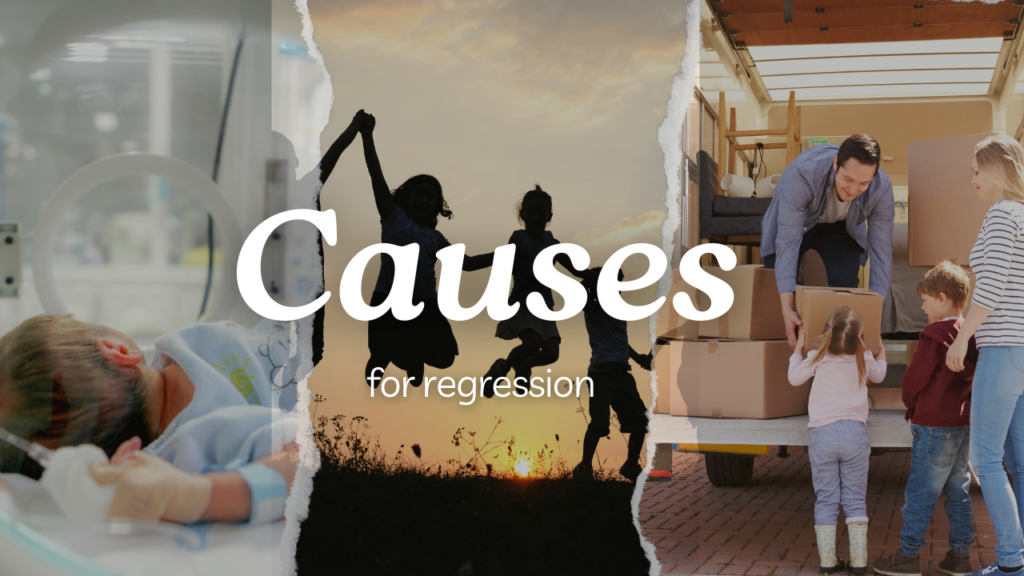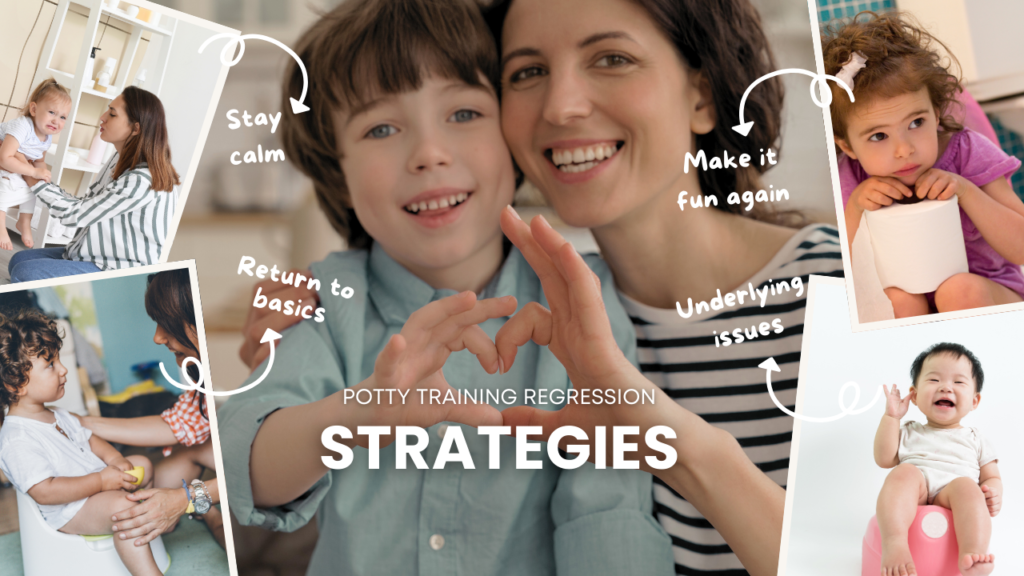How to Deal with Potty Training Regression: What Parents Need to Know

Hi potty training warriors!
If you’re reading this, chances are you’re dealing with a potty training challenge that can feel like taking two steps forward and one step back. I remember when my son, who had been successfully using the potty for months, suddenly started having accidents after his little brother was born.
It was frustrating for everyone involved, but here’s the good news:
potty training regression is completely normal and, more importantly, temporary!
In this guide, we’ll explore everything you need to know about potty training regression, from understanding why it happens to practical strategies for getting back on track. Whether you’re dealing with occasional accidents or a complete return to diapers, we’ve got you covered.
What is Potty Training Regression?

Potty training regression occurs when a child who has been successfully using the toilet starts having frequent accidents or refuses to use the potty altogether.
Think of it like learning to ride a bike – just because your child takes off the training wheels doesn’t mean they won’t occasionally need them again while building confidence.
This regression can happen days, weeks, or even months after successful potty training. While it might feel discouraging, remember that this is a normal part of development for many children.
Just like adults sometimes revert to old habits during stressful times, children may temporarily step back from their potty training progress when facing changes or challenges in their lives.
Common Causes of Regression

Potty training regressions can feel sudden and frustrating, but they often have an underlying cause. Changes in routine, stress, or even minor illnesses can lead to setbacks. Understanding the common reasons behind regression can help you address the issue with patience and reassurance.
Here are the most common triggers:
Major Life Changes
A new sibling, moving to a new home, or starting daycare can create emotional turbulence that manifests in potty training setbacks. I’ve seen this countless times – one mom told me her previously potty-trained 3-year-old started having accidents the week they moved to a new house. Within a month of settling in, he was back on track.
Stress or Anxiety
Children might be dealing with new fears, separation anxiety, or other emotional challenges. Sometimes, the stress isn’t obvious to us adults – it could be as simple as a change in their daily routine or a new teacher at daycare.
Physical Factors
Constipation, urinary tract infections, or other medical issues can cause regression. These physical discomforts might make children associate the bathroom with pain or discomfort.
Busy Schedules
Sometimes children become so engrossed in play or other activities that they forget or ignore their body’s signals until it’s too late. (Haven’t we all been there, putting off a bathroom break during an important meeting?)
Recognizing the Signs of Regression

Sometimes, potty training setbacks can be subtle at first, but recognizing the early signs can help you respond with patience and support. Accidents, resistance to using the potty, or sudden changes in behavior may indicate a regression. Here’s what to look for so you can guide your little one back on track.
Here are key signs to watch for
Remember
Occasional accidents, especially during sleep or in highly exciting situations, are normal and don’t necessarily indicate regression!
Strategies to Address Regression

Potty training setbacks can be frustrating, but they’re a normal part of the process. The key is to stay patient and supportive while gently reinforcing good habits. With the right approach, your little one will get back on track in no time!
4 Tips to Get Your Little One Back On Track.
Stay Calm and Supportive
Your reaction sets the tone. Instead of showing frustration, try saying something like, “Oops, accidents happen! Let’s clean up together and try again next time.”
Return to Basics
Temporarily increase bathroom reminders and scheduled potty breaks. Create a simple routine – perhaps visits every two hours or after meals.
Make it Fun Again
Bring back some of the excitement of initial potty training. Maybe it’s time to shop for new fun underwear or create a special new sticker chart. (One creative mom I know made a “potty party playlist” of short songs to play during bathroom visits!)
Address Underlying Issues
If the regression coincides with a big change, acknowledge and discuss it with your child. Simple conversations like, “I know having a new baby sister is different. It’s okay to feel confused sometimes” can help.
When to Seek Professional Help

In most cases, potty training regressions resolve with time and gentle encouragement. However, if your child is experiencing persistent issues, pain, or extreme anxiety around using the potty, it may be time to seek professional guidance.
Here’s when to consider reaching out for extra support
Tips for Encouraging Progress

Helping your child move past a potty training regression takes patience, consistency, and plenty of encouragement. Small changes in your approach can make a big difference in rebuilding their confidence.
Here are some helpful tips to gently guide your little one toward progress.
- Create a Supportive Environment: Keep the bathroom easily accessible and maintain a positive atmosphere around potty time.
- Offer Choices: Let your child pick out their own underwear or choose between different potty seats. This helps them feel more in control.
- Use Visual Aids: Create a simple reward chart or use children’s books about potty training. (The “Everyone Poops” book is still a classic for a reason!)
- Practice Patience: Remember that every child develops differently. What works for one might not work for another.
Frequently Asked Questions
Key Takeaways

- Maintain a consistent bathroom schedule
- Use positive reinforcement rather than punishment
- Keep spare clothes easily accessible
- Communicate with other caregivers about your approach
- Address any underlying stressors or changes in your child’s life
- Consider temporary use of reward systems to rebuild motivation
- Make bathroom trips fun with books or special toys
- Trust that this phase will pass with patience and support
Conclusion
Remember, potty training regression is a normal part of childhood development. While it can be frustrating, approaching it with patience, understanding, and consistency will help your child get back on track. Every child’s journey is different, and that’s perfectly okay. You’re doing a great job supporting your little one through this challenge!
Follow us on Facebook for more parenting tips and support!
Found this article helpful? Share it with other parents who might be facing similar challenges!
xoxo






